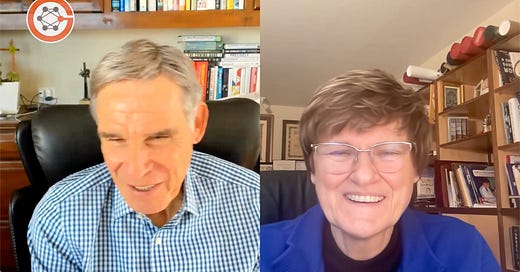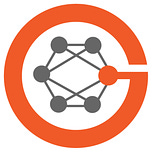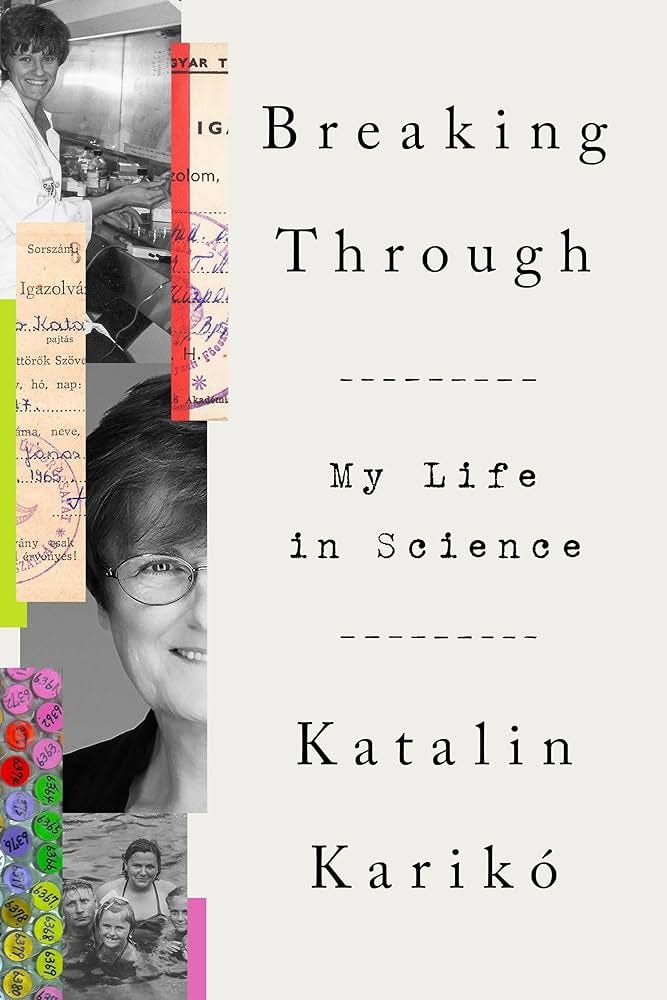“The history of science, it turns out, is filled with stories of very smart people laughing at good ideas.”—Katalin Karikó
Ground Truths podcasts are now available on Apple and Spotify!
The list of obstacles that Kati Karikó faced to become a scientist, to make any meaningful discovery, to prevail over certain scientists and administrators who oppressed her, unable to obtain grants, her seminal paper rejected by all of the top-tier journals, demoted and dismissed, but ultimately to be awarded the 2023 Nobel Prize with Drew Weissman, is a story for the ages. We covered them in this conversation, which for me will be unforgettable, and hopefully for you an inspiration.
Recorded 30 January 2023, unedited transcript below
Eric Topol (00:06):
Well, hello, this is Eric Topol with Ground Truths, and I am really thrilled to have with me Kati Kariko, who I think everyone knows won the Nobel Prize with the Drew Weissman in 2023 and she has written a sensational book, it's called Breaking Through. I love that title because it's a play on words, a breakthrough and breaking through, and we have a lot to talk about Kati, so welcome.
Katalin Kariko (00:34):
Thank you very much for inviting me.
Eric Topol (00:36):
Yes, well I'd like to start off, as you did in the book with your background in Hungary where of course you started with a tough background in a one room house without running water and you never had exposures to scientists and somehow or other you became interested in science and you attributed some of these things like your biology teacher, Mr. Tóth and the book Stress of Life [by Hans Selye] Could you tell us a little bit more what stimulated you in a career of science?
Katalin Kariko (01:18):
I have to say that every child is interested in understanding the nature around them and so I was surrounded with nature because we had big garden, we had animals around and it was an exciting thing. The children ask questions and if they try to find an answer and teachers or parents might give the answer, but definitely the school, even elementary school was very stimulating. Teachers, chemistry teacher, figure out how we can make crystals and I was so excited to have my own crystals and things like that and in high school the teachers were so engaging and not like they tried to put all of the information into your brain, but they encourage you to think yourself, so that's all contributed. I think that most of the child in the first, I don't know, six, seven years of their life that’s how they can see their parents behaving, their friends, the school, classmates, and they shaped what kind of people they will be at the end and the rest of it is refining.
Eric Topol (02:41):
Right, right. Well one of the things I loved that you brought up in the book was how much you liked the TV show Columbo. That's one of my favorite TV shows of all time and one more thing, one more thing. Can you talk a little bit about Columbo? Because in some ways you were like the Peter Falk of mRNA in terms of one more thing.
Katalin Kariko (03:09):
Yes, so I realized that we as researchers, we are not called searchers, we researchers, so we are repeating things. Of course everybody knows who committed the crime in Columbo because this is how it starts and you don't have to figure out, but it seems always that things in a different direction you would lead but all the little clues and some of my colleagues said that they as a physician, they have this tunnel vision. So the patient comes and they can figure out probably from some clues that this is the disease and they get back the lab results and others. Then they realize that one or two things is not fitting, but they always so strongly believe their first instinct. What I taught them to focus on those which will not fit because that will lead to the real perpetrator in case of Columbo.
(04:23):
And so I like the simplicity. I know that what we are doing this research is very over complicated, but we can break down in very simple question, yes or no and then repeating things and many experiments. When I did one was the experiments really the question and the nine of them was like just controls always. I have to have a control for that, control for that and since I work most of the time with my own hands myself, so I had to make sure that I think through that what will be the experimental outcome and then think about that. Do I have a control for that? So that many times in my brain before I performed the experiment in my brain, I predicted that what will be the outcome, of course you never get the outcome what you expect, but at least you have the control that you can exclude a couple of things and so this is how I function usually in the end of the 20th century, 21st century people did not work like I did alone most of the time.
Eric Topol (05:35):
No, I see how you described it in the book was just so extraordinary and it really was in keeping with this relentless interrogation and that's what I want to get into is particularly the time when you came to the United States in 1985 and the labs that you worked in predominantly in Philadelphia through that period before leaving Penn to go on to BioNTech. So, you first kind of beached in at Temple University with a monster at least as you portray him in the book. I mean it was nice that he picked you up at the airport, you and your family. How do you say his name? Suhadolnik.
Eric Topol (06:31):
But not only was the lab kind of infested with cockroaches, but also after working there for a number of years, a few years, you then had gotten an offer to go to Johns Hopkins and when you informed him about that he threatened and did everything he could to ruin your career and get you deported. I mean this was just awful. How did you get through that?
Katalin Kariko (06:58):
As I mentioned later on, I went back and gave a lecture there and I have to say that I always put positivity in forefront, so I learned a lot from him, and he invited me to America. I was always very grateful, and he was kind, and we did very well, and we did a lot of publication. In one issue of biochemistry, we had three papers and two of them I was the first author, so I worked very hard and so he liked that, and he wanted me to stay there. I just learned that from this Selye book that this is what is given and then what I can do, I cannot change him. I cannot change the situation, how I can get out from it and that's what I focused on, so I am not bitter about him. I liked him and the same for other people. When I get an award, I usually thanks to all of these people who try to make my life miserable. They made me work harder.
Eric Topol (08:05):
Well, but you were very kind like you said when you went back to Temple many years later to give the lecture because what he did to you, I mean he was so vindictive about you potentially leaving his lab, which he demanded that he be called the boss and he was going to basically, he ruined the Johns Hopkins job. He called them and you were so nice and kind when you went back to give the lecture without saying a negative word about him, so I give you credit, when somebody goes low, you went high, which is nice.
Katalin Kariko (08:40):
It is important, which I learned from the Selye book, that you don't carry any grudge against anybody because it'll poison you and as Selye also said that when you are very frustrated and very upset, the quickest way you can think about how you can release the stress is revenge. He said, don't do that. It escalate. It hit you back. You have to think about how you can be grateful for the same person you were just ready to take some revenge and that's what you have to practice. Sometimes it is difficult to feel that, but I don't have any bad feeling against my chairman who put my stuff on the hallway.
Eric Topol (09:24):
Oh yeah, I was going to get to that. So then after a short stint at the Uniformed University of Health Science where you had to drive three hours from Philadelphia to go there and you would sleep on the floor. I mean, I have to say Kati, if I was driving three hours, all I'd be thinking about is how desperate situation I was put in by the prior PI you work with. Any rate, you work there and then finally you got a job with my friend Elliot Barnathan, a cardiologist at University of Pennsylvania. So here you are, you're very interested in mRNA and you hook up with Elliot who's interested in plasminogen activators, and you work in his lab and it's quite a story where one of the students in his lab, David Langer, ratted on you for being blunt about the experiments getting screwed up and then later you wind up working in his lab. Tell me a bit about the times with Elliot because he's a very gracious, I think he was very supportive of your efforts and you got him stimulated about the potential for mRNA, it seems like.
Katalin Kariko (10:41):
Yes, so I was desperate to be away from my family at Bethesda and try to get back and every day I sent out several applications. This was in 1989, so you had to send letters and then I called up usually the secretaries about what's going on and I called up also a secretary and she said that they were advertised because nobody was good enough. I said, can you ask him to look at again my application? Then half an hour later, Elliot called me back that come and bring your notebook. He wanted to know what kind of experiment I am doing, and he opened when I came a couple of days later and pulled up a northern blot and he said, you have done that? I said, yes, I did. He said, okay, you are hired and so that, because Elliot is just a couple of days younger than me, I convinced him that we should do kind of mRNA research and he agreed, and we did several experiments and he helped me to get all of these experiments ongoing and so it was a very exciting time and I listened. Elliot was there in many awards ceremony including the Nobel Prize. He was my guest because I was very grateful to him because I have to say that he tried to protect me and he get trouble for that because in higher up and when he was looking for tenure, somehow he get R01, several of them, but they did not put him tenure because he was standing up for me and he paid the price.
Eric Topol (12:42):
Do you think the reason in part that he went to Centocor, a biotech company who I worked with quite extensively was because he stood up for you?
Katalin Kariko (12:54):
He mentioned to the chairman that he's waiting for whether he will be tenured because he has a job offer with ReoPro what he was doing there in the lab and testing out and the chairman told him that, take that job.
Eric Topol (13:11):
Yeah. Well, that's interesting. I know Judy Swain very well, and she did everything she could to hurt your career. She demoted you, or actually she wanted you to leave, but you wound up taking a demotion and also Bill Kelley, who I know well, he was the Dean and CEO of the UPenn. Did he ever get any direct involvement with, because much later on he was advocating for your recognition, but during that time, he could have told Judy Swain to stop this, but did he ever get involved, do you know?
Katalin Kariko (13:45):
I was very low level of nobody, so he would not. It was interesting, we were hired on the same day in 1989. I was first, and I met him, Bill Kelley when the new faculty was hired, and I was so happy because my first project in Hungary was Lesch-Nyhan syndrome, and I know that he discovered the gene, and I was looking up to him very much always.
Eric Topol (14:15):
Well, you said in the book you were over the moon and I have to say, I worked with him. My first job was at University of Michigan, and I worked with him for six years before he left to go to Penn, and we've been friends all these years, but what happened with Judy Swain, as I read in the book, I got all it bristled. I really was upset to read about that. Anyway, somehow you stayed on, Elliot moved, by the way, during that time with Elliot, you were able to get mRNA to make urokinase plasminogen activator (uPA), and that was a step in the right direction. Before we leave, Elliot, if you had stayed there, if he had gotten tenure, do you think you would've ultimately together made the discovery that you did with Drew Weissman?
Katalin Kariko (15:05):
I couldn't be tenured because it is a clinical department and I had a PhD and nobody at the clinical department can be, but I could have been research associate professor if I can get a grant and in 1993, I already had submitted grant on circular RNA. When people in these days, they say that, oh, that's a novelty. Oh, in 1994, 1995, I had several grants on circular RNA I submitted for therapeutic purposes, and Elliot helped me with English and computer, everything what he could, but it is important that he was not an immunologist and I needed discovery. When I work with him, I did not realize the mRNA was inflammatory.
Eric Topol (16:02):
Right, right, exactly. We're going to get to that in a minute. Now, after Elliot left, then you needed someone else to support you, and you wound up with, as I mentioned earlier, David Langer, a neurosurgeon who you previously knew, and he also stood up for you, right?
Katalin Kariko (16:18):
Yes, yes. So at the beginning, every lab, when you have a medical student, they kind of know everything. One day he just told me that, Kati, I will want to learn everything you know, and I will know everything you know. I said, oh, by that time while you are learning, I learned so much more, you never catch me. That always I had to put him back, but kind of he liked how I worked, I concentrate, I didn't chitchat. Then he was just keep coming back when I was working, even with Elliot and he advanced from medical student to residency and so on, and then when he learned that I have no job because Elliot is leaving, then he went to a Eugene Flamm, the chairman of neurosurgery, and he convinced him that neurosurgery needs molecular biologics. That's what he was arguing and thanks to David and the chairman Eugene Flamm, then for 17 years I had a laboratory, and I had a financial support. Not much.
Eric Topol (17:36):
Yeah, I mean that was great, but again, you were not getting any real support from the university and then all of a sudden you show up one day and Sean has all your lab, everything that you worked on thrown in the hallway. I mean, that's just incredible story, right? At any rate, you then wound up because you were basically hawking mRNA as a path of science. It's going to be important. By the way, my favorite quote in the book, Kati. The history of science it turns out is filled with stories of very smart people laughing at good ideas. I just love that quote and it kind of exemplifies your career and your success, but you were steadfast and you ran in, of course, the famous story to Drew Weissman at the Xerox machine, and you were hawking trying to get anybody to believe it as you called it, led to the mRNA Believers Club, which only a handful of people in the world ever got there.
(18:38):
And here you have you take on something that obviously 1960 in your lifetime, early in your lifetime it was discovered, but everyone knew it was unstable, very difficult to work with, very challenging. Of course, you realized that could be beneficial, but you hooked up with Drew the immunologist that you mentioned, and I didn't know by the way, he had type one diabetes. I learned that from your book, and both of you worked so hard and it's just really incredible, but while you're at Penn, the famous or infamous Jesse Gelsinger case and his death occurred and he had the cytokine release syndrome, and you learned from that, right?
Katalin Kariko (19:25):
Yes. By that time, we also could see that the RNA could be inflammatory, but in his case, of course, because the virus was causing it or what certain condition caused that. I have to say that, people work at gene therapy at Penn and mostly of viral programs. When I mentioned I tried to make gene therapy with mRNA, of course everybody felt sorry for me. Poor Kati, hate RNA, it always degrade, but I have to say the degradation is coming mostly because the molecular biology laboratory, they use plasmid, and when they isolate plasmid, like the QIAGEN kit, they start with the RNAs. They add RNAs because you have to eliminate the bacterial RNA, and they contaminate the whole laboratory, the refrigerator door, the gel opera, everybody's RNAs and so that's what extra problem with working with RNA. So I could make RNA, and so it was working and kind of try to express that and I made a lot of RNA for people probably they still have in their freezer, never tested because I was a pusher.
Eric Topol (20:52):
Yeah, yeah. Well, what was fascinating of course is you had already learned in mice about this inflammation from putting mRNA in vivo, and then you made the remarkable discovery, which was the paper in Immunity that had been rejected by Nature and many other papers, even though you had been told if you could get a paper in Nature, maybe that could help your career, right. Back in 2021, the journal of Immunity, a very highly regarded self pressed journal, they asked me to comment on your discovery and I wrote, you may have seen it. Of course, several people wrote Tony Fauci and others. What I wrote was what began as a replacement for a uridine base to squash an inflammatory response in mice evolved into the basis for a broad therapeutic platform to fight both communicable and non-communicable diseases in people. So, this discovery that you made in that classic 2005 paper, which is the most important paper ever published in the journal Immunity, was the Toll-like receptor was mediating the inflammation.
(22:05):
And if you change the uridine to pseudouridine, you could essentially blunt or block the inflammation. This was a seminal discovery that opened up mRNA, but not just for Covid of course, but for so many pathogens and as we'll talk about when we wrap up about all these other things. So when you did this paper and Drew said when it's published, the phones are going to be ring off the hook and no one even acknowledged the paper, right? I mean no one realized how this was one of the most important discoveries in the history of biomedicine, right?
Katalin Kariko (22:43):
Yes. Especially knowing that Drew is not the person who is exaggerating things. Drew is very modest and would not say such things. I am more like daughter, maybe this happened, but he is not like that and I got the one invitation to go to the Rockefeller University for a meeting, and then I went to Japan from 2005 and it was 2006. Both of them that was invitation, and nothing happened in 2007, 2008 and 2009.
Eric Topol (23:24):
But those meetings that you went to, they were kind of obscure like microcosm groups. I mean they were relevant to your work, but they didn't realize this is a big deal. I mean, this is like a world changing type of finding because now you could deliver things in cells. Now of course, you worked on this for three decades and the people that think that you can do a flash in the pan science, but at the same time nanoparticles separately were being pursued. How important were the nanoparticles to make for the package for the ultimate success? When Covid hit in late 2019 and now you had been working at BioNTech, how would you rate the importance of the nanoparticles in the story?
Katalin Kariko (24:23):
For the vaccine it definitely is important because everybody ask the mRNA, if not immunogenic, where do you have the adjuvant? Where is the adjuvant? Then lipid nanoparticle contains an ionizable lipid, which was the adjuvant and why it is important that not the mRNA was inducing the response because the mRNA induced interferon, and if you have interferon, then follicular T-helper cells is not form, and then you get very low amount of antibodies, but if you do not induce interferon, but you induce IS6 and other cytokines is beneficial to have high level of antibodies, so that's what the ionizable lipid was causing and that's the adjuvant in the lipid nanoparticle. Yes, I always emphasize that it is very important and of course when we use the particle that was totalization, then it did not contain ionizable lipid.
Eric Topol (25:24):
Right? I think that's where there's a misconception because of the Nobel Prize recognition last year, a lot of people think, well, that's all tied only to the Covid vaccine. Actually no, your discovery was much bigger than that and it was applied for the Covid vaccine of course with the nanoparticle package, but yours is as we'll get to in a moment, much, much bigger. You left Penn, that was in 2013, and then you spent several years in Mainz, Germany working with the folks at BioNTech, and you really enjoyed that and they appreciated you then as opposed to what you dealt with at Penn where it was just that you kept hearing about the dollars per net square footage and all these ridiculous things and just extraordinary to go back there. Now I just want to mention about your own gene transfer, your daughter. Your daughter is a two-time gold medal Olympiad in rowing, which is incredible. So she didn't go down the path of science, but she also became a world leader in a field. Is that transmitted on a particular chromosome in the family?
Katalin Kariko (26:54):
I think that she just could see that you have to focus on something and then you give up many things and you focus and then achieve, and then you get the new goal, set up a new goal. I mean she get somewhat articulated at Penn, she get a master in science and later in UCLA, she get a MBA degree, but 10 years she was like, for me, it is a very boring thing, just rowing going backwards. Isn't that boring every day? She said, no, mom, it is fun. Every practice is different, I enjoy. The minute I don't enjoy, I will stop doing it.
Eric Topol (27:36):
Yeah. Well it's amazing story about Susan and of course the expansion of your family with a grandchild and everything else that you wrote about in the book. So now let's go to this story, the big story here, which is mRNA. Now you can get into cells, you can deliver just about anything. So now it can be used for genome editing, it can be used for all these different pathogens as vaccines and including not just pathogens but potentially obviously cancer, to rev up the immune system, neurodegenerative disease to prevent these processes and potentially even preventing cancer in a few years ahead. How do you see this platform evolving in the years ahead? You already have seen many vaccines getting approval or under intense study for pathogens, but that just seems like the beginning, right?
Katalin Kariko (28:38):
Yes, yes. When I came to Penn, the major advantage was going to lectures and when I went to the lectures, I always at the end of it think, mRNA would be good for it. So, I was collecting all of these different fields and then what happens is right now I can see the companies are making those RNA, which I thought that it will be useful and even many, many more things that they are applying and now it is up to those specialists to figure out they don't need me. They need experts on cardiology and other fields and allergies. There is also to tolerate allergies and there are so many fields scientists will be figuring out there what is useful for the mRNA, and they can just order now or create their own RNA and test it out.
Eric Topol (29:38):
It's actually pretty amazing because I don't know where we'd be right now if you had not been pushing this against all adversity. I mean just being suppressed and being told, put your stuff out in the hallway or being thrown out of the university and not being able to get any grants, which is amazing throughout all this time, not being able to get grants, it tells a big story and that's why the book is so sensational because it's obviously your autobiography, but it tells a story that is so important. It goes back to that memorable quote that I mentioned. You wrap up the book with your message of your life story, and I do want to read a bit of that and then get your reaction. My first message is this, we can do better. I believe we can improve how science has done at academic research institutions.
(30:38):
For one thing, we might create a clearer distinction between markers of prestige, titles, publication records, number of citations, grant funding, committee appointments, etiquette, dollars per net square footage, and those of quality science. Too often we conflate the two as if there's one in the same, but a person isn't a better scientist because she publishes more or first perhaps, she's holding back from publication because she wants to be absolutely certain of her data. Similarly, the number of citations might have little to do with the value of the paper and more to do with external events. When Drew and I published our landmark Immunity paper and indeed it was, it barely got any notice. It took a pandemic for the world to understand what we've done and why it mattered. I mean, that's profound, Kati, profound.
Katalin Kariko (31:42):
I have to tell you that what I could see as the science progress. Every scientist starts with understanding something to help the world but somehow they publish because they have something to say, but somehow, it's shifted. Now we want more money, more people would come, those people had to get publication because otherwise they cannot graduate. They need first to author a paper. They publish even when it is not finished or have nothing to say and then somehow the focus is promotion. You are advancing your position, and the tool is doing the experiments. If you see I was demoted, I was pushed out so if my goal would have been to see that I am advancing, then I would give up because that's what the problem is. So that focus is going away from the original thing that we want to understand the science because if you want to understand the science, you are even happy when you can see a publication doing half of that you have done already because you say, I wanted to understand, here's a paper they did, similar thing I did, but the people think, oh my god, my journal paper is out and my promotion is out because they discovered and they published before me, so that's the problem.
Eric Topol (33:12):
Well, I mean if I made a list of all the adversity that you faced from growing up in the Russian communist run Hungary to coming to the US not even knowing the language and also all the sacrifices you made along the way with your family and when you would go to Bethesda or when you moved to Mainz or I mean all along the whole time, no less what the university of Temple or Penn. I mean the list is very long and somehow you prevailed above all that, which is just so startling but another thing I want to just get into briefly, as you know, this has been a shocking counter movement to the vaccines and giving ridiculously the mRNA as a bad name. In the book, you kind of had a way to foreshadow this because back in the 1968 pandemic that you obviously experienced, here you talked about that.
(34:30):
You said we restricted our movement, limiting our contact with others. We scrubbed, we disinfected. I suppose the party encouraged this, but nobody complained about government overreach. This was a virus. It had no ideology, no political agenda. If we weren't careful, it would spread, then we would all suffer. These were just the facts. That's how viruses work. So how come we still don't know that? That was 1968 in Hungary and here we're go in the United States, and we have a huge movement, anti-vaccine, anti mRNA, Covid vaccines, and it's very worrisome because all the great science is threatened by this misinformation and disinformation. What are your thoughts about that?
Katalin Kariko (35:27):
Yes, I heard that viruses, they love democrats because everybody can do whatever they want, whereas in other countries give an order, everybody has to have vaccine and then that's different, but yes, I understand that the novelty the people were always against, even when X-ray was introduced, people thought that people will look through my clothes and seeing me naked because they take part of the truth and they don't say, maybe through the flesh is going through and I can see somebody's bone or something. Then they distort, and they create a fear and if you make fear, then you can control like Lord of the Flies, somebody you are afraid of and then you can control and you can be afraid of the virus or you can be afraid of the vaccine. Then that's what I don't understand exactly true said that when they investigated those who are spreading most of these news about against the vaccine is they are selling some kind of products benefiting just like a hundred years ago, those who were afraid that they can see through their clothes some they start to sell X-ray resistant underwear.
(36:57):
Of course people, they made money on the people's fear. I don't know that’s how to fight it or I think that the honesty when the scientists would say that, listen, we don't know today how it spread. This is how we suggest, be afraid, wash everything. Oh no, we know that it is in the air so that okay, you don't have to wash your clothes when you go out and come back but don't go to crowded places. In politics it's not working because it is like wishy-washy. Yesterday you said something and today, because we learn, they have to understand this is a science process constantly correcting. In politician, I know everything, this is how to do, they want to reflect this confidence. That's what it is and that's why politics everywhere mixed up with this. Some leaders want to reflect this confidence and they do things which helps the virus to spread.
Eric Topol (38:11):
Right. Well, I'm glad to get your perspective because obviously when you work so hard throughout your career and then you see the backlash, that's unwarranted. It's always good to be circumspect of course, but to say that this was done in a flash in the pan and it's never really, it's gene therapy and it's changing your DNA, I mean it's a lot of crazy things that of course that you brought out in the book as well. Now before wrapping up, you wrote the book before you were awarded the Nobel Prize and this recognition, you and Drew of course became fantastic, so richly deserved, but many things occurred and I wanted to ask you. For example, you did your PhD and your postdoc at the University of Szeged in Hungary, and you went back there, and I think you were celebrated in your university, perhaps the first Nobel laureate. I don't know, I would imagine perhaps. The second, oh okay but also the last thing that was recognized in the book it was a much different thing. It was like the Time 100 recognition but now that you have had many of these unanticipated awards, what are your thoughts about that? I mean, it is wonderful to get recognized by the university that you trained and the people that you grew up with.
(39:53):
Has this changed your life or is it really very much the same as it was?
Katalin Kariko (40:00):
My life is very much the same as it was. I am living in the same house. We moved in 1989 and okay, last year I get a new car. Up until then, I never had, only just some beat-up, last year I purchased my first new car but that's luxury when you are 68 years old, you could afford. Everything was a surprise because 40 years I never get any award and the first award I get in 2021. I tried to articulate to more people, life as a scientist is similar to mine. They are immigrant, they are not recognized and I try to tell them just not to focus something like the university is not grateful. Who is the university? Just they are walls. What administrator would tap your shoulder. You have to know that what you are doing is important and if you get pushed around, you always have to do what Selye said, figure out what you can do. Always that, not what they should do. The agency should give me the money, the boss, the superior should help me. No, I cannot make other people to do. I have to figure out what I can do. I can write better and better and rewrite, generate more data for a submitted grant application and always, that's why all of these naysayers made me better because I'm not focused on revenge or anger, but always, how can I be better.
Eric Topol (41:53):
So that gets me to what you do next. I know you're an avid reader. I know you read so much about science and your field and broader of course I take it you still are doing that, but what's in the next chapter for you? I can't imagine you're ever going to rest.
Katalin Kariko (42:16):
No, no. I will be six feet under when I can rest, I realize now. It is just that you are on a different field, and you understand like nucleotides, how naturally you make RNA, what is the transporters, what is happening in the mitochondria, different things that iron sulfur clusters and then you start to investigate like three months I was just reading one topic. I didn't even know about it or how in my life I was reading so many things. I realized there are so many diseases, I understand what is the reason, people don't. When I was at Penn I went to different people, professors about my idea for certain diseases but I was nobody and nobody listened. Now, I'm somebody. I have to be very careful because I say a name of the disease people will line up here and say, don't talk to Eric. Go and do something, help us and so that's what I try to help. I think that I understand certain disease, which is so enigmatic and nobody has a clue and maybe I have a solution for that. That's what I try to do now.
Eric Topol (43:38):
Do you ever go to Penn? Do you ever go to work in there?
Katalin Kariko (43:44):
No, I don't. When you are forced to retire, and I knew that they would throw me out because it was 2012, right before Christmas I was told that get out because you didn't get the 2012. Last time I submitted an mRNA for stroke therapy. Still very valid and good idea but anyway, I knew that I will be pushed out, but I don't have grudge, even the chairman. How can I expect the neurosurgeon who is doing the operation he just can see that I did not get the funding and those people who make the decision that my proposal is not good, they are expert. He's not an expert. He just can see that this is what the expert said. I talk to him, I don't blame anything.
Eric Topol (44:37):
Good for you. I mean I think it's much easier to be vindictive and you have to have the philosophy that you have, which is not to hold any grudges after all that has basically been done to you by many people along the way and I think we've covered that. I know this is a very different interview perhaps than many others that you've had. I didn't bring up the teddy bear and I didn't bring up a lot of things that others have brought up because they've already been covered. I wanted to get into what you had to endure, what you had to do to persevere and how it has changed the life science and medicine forever and now, still today, the mRNA package will be improved. I mean we've already learned, for example, the change of the two proline substitution that Andrew Ward at my place, along with Jason McLellan and others to make it to better immune response. It can be improved with a 6-P proline substitution. We can beat nature just like you did with the uridine substitution and the nanoparticles will improve and this whole package has got an incredible future but it's thanks to you, if it induced massive inflammation, it never would've been possible.
Katalin Kariko (46:02):
Yes, I always said that hundreds and thousands of scientists, every time I thanks them, those people, even not with us, I was reading their papers and it all contributed to this development and learning. So, I am not thinking that I was many, many other people together, we did that.
Eric Topol (46:30):
Well, I am so indebted to you as everyone who understands sciences, and it's of course a bigger story than mRNA. It's what you endured and how you persevered and against all odds, I mean truly against all odds, so thank you. Did I miss anything that I should have asked you about?
Katalin Kariko (46:51):
No. I have to say the book came out and now I can see in different social media that how other scientists get inspired. There was one who said that she quit doing PhD and she read my book and she cried, she laughed, and she went back. She realized that there is more to it because so many is expecting to do some work and then there will be some rewards. The rewards is this is not a short distance. This is a marathon to be scientist and you have to see the goals and it will one day and you might not the one that cross first the finish line, but you are helping others. That's what is important and that's what I am glad that I work with this and write this book so that other scientists more can associate because they feel the same way, that they are not appreciated. Things are not going as expected and then they might be inspired not to give up and that's what is also an important message.
Eric Topol (48:11):
Well, that's why I love the book because it is so inspirational and it will make people cry. It will make people commit to science or appreciate it more than ever. I don't know if you saw it, but I put it as my 10 favorite books for 2023 and indeed, I could have been the most favorite in many respects. So I hope more people listening or watching the video will read the book because it has a lot. I'm so glad you wrote it, Kati, because if we only knew you from papers and Nobel Prize, you wouldn't know the true story. We wouldn't know really what your life has been like over these many decades. So, thank you for that as well and thank you from the life science, the medical community, and for everyone, for all that you've done to change the future and the current state of medicine.
Katalin Kariko (49:10):
Yeah, thank you very much asking and I might add to the book that the book is published in many different languages is coming Italian and French, German, Thai, Japanese, Chinese. So scientists all over the world can read their native language and maybe they will be inspired.
Eric Topol (49:28):
Oh, I have no question about that. It's a story that it should be a movie so that the people that won't read the book will hopefully watch the movie. Has there already been a plan for that?
Katalin Kariko (49:40):
There was, but I don't think that you know they have this strike during the summer, and I don't know where it ends.
Eric Topol (49:52):
I wouldn't be surprised if it gets done in the future and I hope they'll consult with you, not just read the book and it'll be interesting who they get to play you in the movie, but thank you so much, Kati. What a joy and I look forward to future visits with you.














Share this post